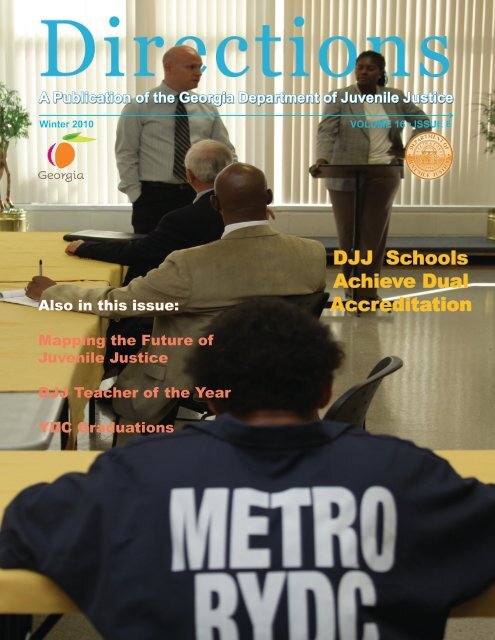A Publication of the Georgia Department of Juvenile Justice
A Publication of the Georgia Department of Juvenile Justice
A Publication of the Georgia Department of Juvenile Justice
- No tags were found...
Create successful ePaper yourself
Turn your PDF publications into a flip-book with our unique Google optimized e-Paper software.
A <strong>Publication</strong> <strong>of</strong> <strong>the</strong> <strong>Georgia</strong> <strong>Department</strong> <strong>of</strong> <strong>Juvenile</strong> <strong>Justice</strong>Winter 2010 VOLUME 16 • ISSUE 6Also in this issue:DJJ SchoolsAchieve DualAccreditationMapping <strong>the</strong> Future <strong>of</strong><strong>Juvenile</strong> <strong>Justice</strong>DJJ Teacher <strong>of</strong> <strong>the</strong> YearYDC Graduations
Sonny PerdueGovernorCONTENTS3 Looking to <strong>the</strong> Future: <strong>Juvenile</strong> <strong>Justice</strong> ForumDIRECTIONSLooking to <strong>the</strong> Future:DJJ BOARDJ. Daniel ShumanChairDr. Edwin A. RislerVice ChairDaniel Augustus MenefeeSecretaryLarry BarnesMichael Lee BaughBruce GarrawayVan Ross HerrinJames P. Kelly IIIElizabeth Graham LindseyPerry J. McGuireJudy MecumDexter RowlandStephen K. SimpsonElaine P. SnowSandra Heath TaylorJUDICIAL ADVISORY COUNCILThe Honorable Quintress J. GilbertThe Honorable Steven C. TeskeCOMMISSIONERGarland R. Hunt, Esq.EDITOR-IN-CHIEFScheree MooreWRITING STAFFNathan CainEDITING TEAMNathan CainJanssen RobinsonPUBLISHERPrinted Communications Inc.4 Commissioner’s Corner5 Turning Point Event a Success7 DJJ Teacher <strong>of</strong> <strong>the</strong> Year6 Going <strong>the</strong> Extra Mile9 YDC Graduations10 Making History: DJJ Schools Achieve DualAccreditationMISSION STATEMENTThe mission <strong>of</strong> <strong>the</strong> <strong>Department</strong> <strong>of</strong> <strong>Juvenile</strong> <strong>Justice</strong> is toprotect and serve <strong>the</strong> citizens <strong>of</strong> <strong>Georgia</strong> by holdingyouthful <strong>of</strong>fenders accountable for <strong>the</strong>ir actionsthrough <strong>the</strong> delivery <strong>of</strong> treatment services and sanctionsin appropriate settings, and by establishing youth in <strong>the</strong>ircommunities as productive, law abiding citizens.DISCRIMINATION STATEMENTThe <strong>Department</strong> <strong>of</strong> <strong>Juvenile</strong> <strong>Justice</strong> prohibits discriminationon <strong>the</strong> basis <strong>of</strong> race, color, national origin, sex, disability,and age in its programs and activities. For employee issuescontact Sam Clonts at (404) 508-6500. For youth issues,contact William Amideo at (404) 508-6500.Please direct questions and comments to:<strong>Georgia</strong> <strong>Department</strong> <strong>of</strong> <strong>Juvenile</strong> <strong>Justice</strong>Office <strong>of</strong> Communications3408 Covington HighwayDecatur, GA 30032Telephone: (404) 508-7147Fax: (404) 508-7431Email: publicaffairs@djj.state.ga.usWebsite: www.djj.state.ga.usChild Welfare Agencies Come Toge<strong>the</strong>r to Mapout a Future for <strong>Juvenile</strong> <strong>Justice</strong> In <strong>Georgia</strong>Just <strong>the</strong> use <strong>of</strong> <strong>the</strong> term “The System” can conjure up an image <strong>of</strong> a bureaucratic maze where <strong>the</strong> right hand <strong>of</strong>tendoes not know what <strong>the</strong> left hand is doing. In <strong>the</strong> child welfare system, <strong>the</strong>re are many stakeholders includingeducators, social workers, judges, probation <strong>of</strong>ficers, public defenders and prosecutors, all <strong>of</strong> whom are workingto help ensure <strong>the</strong> safety <strong>of</strong> <strong>Georgia</strong>’s youth and <strong>the</strong> community, although <strong>the</strong>y may have different perspectiveson how to achieve those goals.Bringing toge<strong>the</strong>r people from all <strong>of</strong> <strong>the</strong> various parts <strong>of</strong> <strong>Georgia</strong>’s child welfare system was <strong>the</strong> driving idea behind <strong>the</strong><strong>Juvenile</strong> <strong>Justice</strong> Forum, held September 14-15 at Lake Lanier Islands. The forum was sponsored by <strong>the</strong> Governor’sOffice <strong>of</strong> Children and Families. Representatives from The <strong>Department</strong> <strong>of</strong> <strong>Juvenile</strong> <strong>Justice</strong>, <strong>the</strong> Division <strong>of</strong> Family andChildren’s Services (DFCS), juvenile court judges, juvenile prosecutors, public defenders, educators, and law enforcement<strong>of</strong>ficials from across <strong>the</strong> state attended <strong>the</strong> invitation only event.The goal <strong>of</strong> <strong>the</strong> forum wasn’t just talk. It was action. Deputy Commissioner <strong>of</strong> Youth Services for <strong>the</strong> <strong>Department</strong> <strong>of</strong><strong>Juvenile</strong> <strong>Justice</strong> Rob Rosenbloom said <strong>the</strong> conference was meant to foster a regional approach to juvenile justice asopposed to a statewide one because people in <strong>the</strong> community are <strong>the</strong> ones who know what resources are available, andare in a position to coordinate <strong>the</strong>ir efficient use.“We recognize that it’s at <strong>the</strong> local level where <strong>the</strong> rubber meets <strong>the</strong> road,” said Rosenbloom. “It’s <strong>the</strong> front line staff thathas <strong>the</strong> potential to work toge<strong>the</strong>r to ensure an efficient use <strong>of</strong> resources and best outcomes for youth.”The conference was organized with <strong>the</strong> aim <strong>of</strong> facilitating local collaboration. Instead <strong>of</strong> lumping everyone toge<strong>the</strong>r fora large brainstorming session, participants were put in affinity groups where <strong>the</strong>y worked toge<strong>the</strong>r to identify what <strong>the</strong>ysaw as <strong>the</strong> three biggest issues facing <strong>the</strong> juvenile justice system in <strong>the</strong> next five years. After reaching consensus, <strong>the</strong>groups visited each o<strong>the</strong>r and listened to one ano<strong>the</strong>r’s ideas. Later, <strong>the</strong>y voted on <strong>the</strong> collected ideas to come up with<strong>the</strong> three top issues. The next day, <strong>the</strong>y broke into regional groups to begin <strong>the</strong> planning process, with <strong>the</strong> goal <strong>of</strong> comingup with ideas to address <strong>the</strong> issues in <strong>the</strong>ir communities.Clayton County <strong>Juvenile</strong> Court Judge and DJJ Judicial Advisory Council MemberSteven Teske speaks at <strong>the</strong> <strong>Juvenile</strong> <strong>Justice</strong> Summit.Paulding County <strong>Juvenile</strong>Program Manager (JPM)Terry Isaac said he liked<strong>the</strong> way <strong>the</strong> conferencewas run.“It was definitely veryproductive,” Isaac said.“It was an opportunity forgrass roots workers to beheard at a higher level.”In <strong>the</strong> end, <strong>the</strong> group<strong>of</strong> approximately 100participants identified <strong>the</strong>three issues <strong>the</strong>y thoughtneeded addressed in orderto be more successfulat delivering services tojuveniles and ensuringpublic safety.2 Continued on page 8 3
DIRECTIONSCommissioner’s CornerEducation is <strong>the</strong> greatest service we can <strong>of</strong>fer <strong>the</strong> youth entrusted to our care. Educationopens <strong>the</strong> door to success, and helps youths realize that <strong>the</strong>re is ano<strong>the</strong>r path for <strong>the</strong>mto travel o<strong>the</strong>r than <strong>the</strong> one <strong>the</strong>y are on. Merely locking youths up would accomplish verylittle. Every youth who gets a diploma or GED, or earns a certificate <strong>of</strong> credit takes a big stepdown <strong>the</strong> path toward becoming a productive member <strong>of</strong> society.We have reason to celebrate this year. In October, representatives from <strong>the</strong> Sou<strong>the</strong>rn Association<strong>of</strong> Colleges and Schools (SACS) as well as <strong>the</strong> Correctional Education Association (CEA)recommended that <strong>the</strong> DJJ school system should receive full accreditation. This announcementmarked <strong>the</strong> culmination <strong>of</strong> a two year process led by Regional Principal Dr. Rufus Johnson ando<strong>the</strong>r education staff in Central Office and throughout <strong>the</strong> state.J. Daniel Shuman <strong>of</strong> Tattnall County retired from his seven year tenure as chairman <strong>of</strong> <strong>the</strong> Board <strong>of</strong> <strong>the</strong> <strong>Department</strong><strong>of</strong> <strong>Juvenile</strong> <strong>Justice</strong> on Thursday, Dec. 9, 2010. Shuman was first appointed to <strong>the</strong> Board in 2003 by Governor SonnyPerdue. He represented <strong>the</strong> 12 th Congressional District. He was elected acting Chairman in 2004, and elected to a fulltermin 2005. He was reelected chairman in 2007. Shuman had agreed to serve on <strong>the</strong> board for <strong>the</strong> duration <strong>of</strong> Perdue’sterm in <strong>of</strong>fice, and he announced his retirement after <strong>the</strong>2010 gubernatorial election.During his tenure on <strong>the</strong> board, <strong>the</strong> <strong>Department</strong> <strong>of</strong> <strong>Juvenile</strong><strong>Justice</strong> emerged from 11 years <strong>of</strong> monitoring by <strong>the</strong> UnitedStates <strong>Department</strong> <strong>of</strong> <strong>Justice</strong>. The end <strong>of</strong> federal oversightwas marked by a press conference at <strong>the</strong> Capitol whereGovernor Perdue announced <strong>the</strong> accomplishment.<strong>Department</strong> <strong>of</strong> <strong>Juvenile</strong> <strong>Justice</strong> Commissioner Garland R.Hunt, Esq. said Shuman was instrumental in guiding <strong>the</strong>agency through a difficult time, and helping to turn it into<strong>the</strong> national model <strong>of</strong> a juvenile correctional departmentthat it is today.“Chairman Shuman’s leadership will be missed,” Huntsaid. “He took on a difficult job at a difficult time for <strong>the</strong>agency, and he did it well. His tenure as chairman issomething <strong>of</strong> which he should truly be proud.”Garland R. Hunt Esq.CommissionerThe accreditation team visited <strong>the</strong> Metro, DeKalb, Macon, Aaron Cohn, and Augusta RYDCs aswell as <strong>the</strong> Macon, Muscogee, and Augusta YDCs. In all, <strong>the</strong> team spoke to over 100 people, including board members,educators, administrators, students, parents and members <strong>of</strong> <strong>the</strong> community before announcing <strong>the</strong>ir decision at aspecial called board meeting. This is only <strong>the</strong> second time that both agencies have conducted a dual accreditation tour,and I am certain that having dual accreditation will not only help <strong>the</strong> youth we serve, but also spur us on as we strive forcontinuous improvement.We do not have <strong>the</strong> luxury <strong>of</strong> resting on our laurels. As you well know, <strong>the</strong> recession has hit all state government hard,and that has resulted in cuts to vital programs, including education. Do not be discouraged, though. We must face ourchallenges head on with discipline and resolve. We cannot expect to impress upon youth <strong>the</strong> importance <strong>of</strong> resilience in<strong>the</strong> face <strong>of</strong> adversity unless we demonstrate it for <strong>the</strong>m.Daniel Shuman Retires as DJJ Board ChairmanCommissioner Garland Hunt presents Chairman DanielShuman with a plaque and resolution commemoratinghis years <strong>of</strong> service on <strong>the</strong> Board <strong>of</strong> <strong>Juvenile</strong> <strong>Justice</strong>.Transitioning Youth Back Into <strong>the</strong> Community Continues to be a PriorityFormer Fulton County <strong>Juvenile</strong> Court Judge and current television celebrity and author Judge Glenda Hatchettwas <strong>the</strong> keynote speaker at The Turning Point Conference held at Mercer University in Atlanta on Saturday, October 16.The event, held in conjunction with Pen Pal Mentors for Incarcerated Youth, was focused on helping youth who are in<strong>the</strong> juvenile justice system transition successfully back to <strong>the</strong> community where <strong>the</strong>y can become law abiding citizens.Hatchett urged those present to try and understand <strong>the</strong> points-<strong>of</strong>-view <strong>of</strong> youth who are coming from <strong>the</strong> criminal justicesystem.“We can’t help <strong>the</strong>m carve out a new road unless we understand <strong>the</strong> road <strong>the</strong>y’re on,” she said.The event focused on <strong>the</strong> need for employers and members <strong>of</strong> <strong>the</strong> community to extend a second chance to youngpeople who come out <strong>of</strong> <strong>the</strong> criminal justice system, whe<strong>the</strong>r through <strong>of</strong>fering <strong>the</strong>m an opportunity at a job, or throughmentoring.Speakers included Commissioner Garland R. Hunt, Esq., Deputy Commissioner<strong>of</strong> Programs and Support Services Amy Howell, Associate Superintendent Dr.Jack Catrett, as well as DeKalb County Commissioner Lee May, DeKalb Countydistrict attorney candidate and former solicitor-general Robert Hale, and SchnaviaBronson, founder <strong>of</strong> Pen Pal Mentors.Johnson said that Pen Pal Mentors came about when she, through her seven years <strong>of</strong> volunteer efforts at <strong>the</strong> MaconYouth Development Campus (YDC), DJJ’s all female facility, realized that <strong>the</strong> youths <strong>the</strong>re were hungry for contact withsuccessful adults who could guide <strong>the</strong>monto <strong>the</strong> straight and narrow.Commissioner Garland Hunt speaks with former Fulton Countyjuvenile court judge and television personality Glenda Hatchett.“I didn’t create Pen Pal Mentors,” Bronsonsaid. “The young people did.Former DJJ students were also present at<strong>the</strong> event, and <strong>the</strong>y spoke candidly about <strong>the</strong>challenges <strong>the</strong>y faced trying to reintegrateinto <strong>the</strong> community. The students said thatstrained family relationships and limitedresources pose a real challenge to youthswho come out <strong>of</strong> a facility and want t<strong>of</strong>ur<strong>the</strong>r <strong>the</strong>ir education or find work.The event was part <strong>of</strong> DJJ’s ongoing effortsto reintegrate formerly incarcerated youthback into <strong>the</strong> community so that <strong>the</strong>y have<strong>the</strong> opportunity to lead productive adultlives as contributing members <strong>of</strong> society.Coy Satterfield, who organized <strong>the</strong> eventand is responsible for <strong>the</strong> creation <strong>of</strong> DJJ’sYouth Transition Board, said transitionalservices are crucial to <strong>the</strong> mission <strong>of</strong> DJJ. When budget cuts hit <strong>the</strong> Office <strong>of</strong> Education’s youth reentry program,Satterfield said, it became imperative to find new ways <strong>of</strong> providing those services, which are key in helping to reducerecidivism among youth. If youth come into <strong>the</strong> system and don’t see any sort <strong>of</strong> future, <strong>the</strong>y are unlikely to take <strong>the</strong> idea<strong>of</strong> rehabilitation seriously, he said.“You don’t want youth to come into <strong>the</strong> system without hope,” he said.DIRECTIONSTurning Point Event a Success“We can’t help <strong>the</strong>mcarve out a new roadunless we understand<strong>the</strong> road <strong>the</strong>y’re on.”-Judge Glenda Hatchett4 5
DIRECTIONSGoing <strong>the</strong> Extra MileBob Richards RYDC Educators Help Youth Earn his HighSchool DiplomaCole Hollander receives his high school diploma during aceremony at <strong>the</strong> Bob Richards RYDC.Youths at <strong>the</strong> Bob Richards Youth Detention Center(RYDC) come and go, usually not staying for verylong, but that does not mean <strong>the</strong> staff <strong>the</strong>re won’tgo above and beyond to help <strong>the</strong>m.Just how much <strong>the</strong> staff <strong>the</strong>ir care was evident when ColeHollander received his high school diploma at <strong>the</strong> facilityduring a ceremony on Wednesday, June 9 at <strong>the</strong> facility.When Hollander was sent to Bob Richards, he lackedonly two credits for graduation. At <strong>the</strong> facility, awaitingplacement, Hollander decided to buckle down and earn<strong>the</strong> credits needed before he left <strong>the</strong> facility.All <strong>of</strong> his hard work paid <strong>of</strong>f when, in front <strong>of</strong> family andfacility staff, DJJ Associate Superintendent Dr. Jack Catretthanded Hollander his diploma and declared him a highschool graduate. Hollander is <strong>the</strong> third student to graduatefrom one <strong>of</strong> <strong>the</strong> department’s short-term facilities.Catrett said <strong>the</strong> work done by <strong>the</strong> staff to help Hollanderreach his goal proves how much <strong>the</strong>y care about <strong>the</strong>youths sent to stay with <strong>the</strong>m.“If <strong>the</strong>y care enough to do this,” Catrett said, addressing<strong>the</strong> youths directly, “<strong>the</strong>n <strong>the</strong>y care about what you need.”Hollander’s situation was not <strong>the</strong> first time Bob Richardsemployees have gone <strong>the</strong> extra mile to help a youthgraduate. In 2001, a young man from Alabama namedAaron Kelly was sent to Bob Richards. Staff at <strong>the</strong> facility,including lead teacher Elizabeth Stafford, arranged forKelly to receive his assignment from his home school andarranged to have his work sent <strong>the</strong>re for evaluation by histeachers. Kelly completed his graduation requirementswhile at Bob Richards, and <strong>the</strong>n went on to enlist in <strong>the</strong>Army.Galyon Named DJJ’sTeacher <strong>of</strong> <strong>the</strong> YearDJJ Teacher <strong>of</strong> <strong>the</strong>Year for <strong>the</strong> 2011-12 school year,Dewayne Galyon,almost didn’tbecome a teacher.Right out <strong>of</strong> highschool he thoughtabout going intoteaching, but endedup being talkedout <strong>of</strong> it by his oldelementary schoolprincipal.Instead, after gettingan associate’sdegree, <strong>the</strong>Tennessee nativeended up working asa reporter for a smalluntil <strong>the</strong> wee hours<strong>of</strong> <strong>the</strong> morningand trying to raisea family weren’tworking out, soGalyon went back toschool at TennesseeWesleyan, andturned back tohis original careerchoice.After spendingfive years in <strong>the</strong>Tennessee PublicSchool System asa social studiesteacher andassistant coachfor basketball andbaseball, GalyonCommissioner Garland Hunt congratulatesDJJ Teacher <strong>of</strong> <strong>the</strong> Year Dewayne Galyon.Shaw Jr. RYDC). Hedidn’t get <strong>the</strong> job <strong>the</strong>first time, but a yearlater he got calledagain. This time hegot <strong>the</strong> job, startingin November 1999.In 2001, Galyonbecame <strong>the</strong> leadteacher, in charge<strong>of</strong> overseeing a staff<strong>of</strong> two teachers, arecords clerk, and aninstructor.Elbert Shaw DirectorBobby Hughessaid Galyon is verydedicated to his job,and is <strong>of</strong>ten <strong>the</strong> firstto arrive and <strong>the</strong> lastto leave. Galyon isalso always eager tohelp in <strong>the</strong> facility’sprograms outside<strong>the</strong> classroom,Hughes said. Galyonis involved with <strong>the</strong>facility’s dog kenneland greenhouseprograms, and alsostays abreast <strong>of</strong> <strong>the</strong>latest educationaldevelopments,so that he canintroduce cuttingedge educationaltechniques, Hughesadded.“Perhaps <strong>the</strong>biggest, and mostsimple complimentyou can pay Mr.Galyon is that hecares,” Hughes said.DIRECTIONS“Most <strong>of</strong> our kids are,at heart, pretty goodkids, and I enjoybeing around <strong>the</strong>m,”he said.While some <strong>of</strong><strong>the</strong> kids can bechallenging, and itcan be hard to reallyreach kids who knowthat <strong>the</strong>y are likelyonly going to be in<strong>the</strong> facility for a dayor two, <strong>the</strong> goal isto “plant a seed,”Galyon said.“Every kid you reachis a victory,” said<strong>the</strong> married fa<strong>the</strong>r <strong>of</strong>three.Galyon expressedno regrets aboutchanging careers,which has allowedhim to spend timecoaching his son’ssoccer team andengaging in outdooractivities that heenjoys. He feelslucky to have foundboth pr<strong>of</strong>essionaland personalfulfillment.“Teaching’s notfor everybody,” hesaid. “But I’ve foundthrough <strong>the</strong> yearsI relate to <strong>the</strong> kidspretty well. I thinkthat’s one <strong>of</strong> mybiggest strengths.”UrrutiaHonored forChild AdvocacyCoweta County <strong>Juvenile</strong>Probation and ParoleSpecialist III (JPPSIII) Jean Urrutia washonored by <strong>the</strong> StateBar <strong>of</strong> <strong>Georgia</strong> YoungLawyers Division for heroutstanding advocacyfor youth during <strong>the</strong>Young Lawyers Division’sannual Child AdvocateAwards. She has sincebeen promoted toCoweta County <strong>Juvenile</strong>Program Manager.Urrutia received <strong>the</strong>award on June 16,at a ceremony at <strong>the</strong>State Bar headquartersin Atlanta. She is <strong>the</strong>agency’s liaison to <strong>the</strong>local juvenile court andserves as an advisoron delinquency mattersto <strong>the</strong> Coweta CountyBoard <strong>of</strong> EducationSpecial EducationTeacher TrainingProgram. She alsoserves as <strong>the</strong> agency’sSpanish translator forDistrict Four as well as<strong>the</strong> local juvenile court.She is a member <strong>of</strong> <strong>the</strong>Parent and ChildrenCoalition, and <strong>the</strong>Children and Familyalliance and participatesin LIPT. In addition toall her extra work, shecarries a caseload <strong>of</strong>committed youth.daily newspaper applied for a jobKelly returned to Bob Richards RYDC for Hollander’sfor a couple <strong>of</strong> with Whitfieldgraduation as a staff sergeant, to give a commencementyears. From <strong>the</strong>re County Schools inaddress at <strong>the</strong> ceremony.he moved on to <strong>the</strong> <strong>Georgia</strong>. He endedKnoxville Journal, up getting a call fromKelly said he recognized a lot <strong>of</strong> old faces at <strong>the</strong> facility, and that he had never forgotten what <strong>the</strong> staff <strong>the</strong>re did forwhere he worked for The <strong>Department</strong> <strong>of</strong> Galyon, whohim. Without <strong>the</strong> guidance he was provided at <strong>the</strong> Bob Richards RYDC by <strong>the</strong> caring individuals that work <strong>the</strong>re, hethree years, primarily <strong>Juvenile</strong> <strong>Justice</strong>, teaches a little bit <strong>of</strong>said, his life would have probably gone down a different, darker path.covering sports. who were looking everything at <strong>the</strong> 30-While he loved <strong>the</strong> for a teacher for <strong>the</strong> bed facility, said that“It was an honor to return to <strong>the</strong> facility under <strong>the</strong> circumstances,” Kelly said. “That young man has a lot <strong>of</strong> potential.”work, he said, <strong>the</strong> Dalton Regional working with kids is“I love what I do. I lovehours eventually Youth Detention <strong>the</strong> best part <strong>of</strong> hiswho I work for. I believe ingot to him. Working Center (later job.our mission,” Urrutia said.from late afternoon renamed <strong>the</strong> Elbert6 7
DIRECTIONSMapping <strong>the</strong> Future ContinuedContinued from page 3They are:• A need for more effective policies and legislation that favor and promote <strong>the</strong> use <strong>of</strong> evidencebased juvenile justice practices that are in <strong>the</strong> best interest <strong>of</strong> youth, rehabilitation andcommunity safety with a strong view toward prevention.• A lack <strong>of</strong> understanding, a framework, protocol and will for solving juvenile justice problems.• A better approach to multi-system youth.Building RelationshipsMichael Key, juvenile court judge in Troup County and president <strong>of</strong> <strong>the</strong> National Council <strong>of</strong> Family and <strong>Juvenile</strong> CourtJudges said relationships are essential if juvenile justice workers are going to improve service delivery to youths. Keysaid that between 2003 and 2006 Troup County reduced use <strong>of</strong> secure confinement for juveniles by over 50 percentwithout compromising public safety.Regional Administrator Carl Brown writes outideas during a brainstorming session.“We did not compromise public safety by doing that,” he said.“In my county <strong>the</strong> success we have enjoyed has been because <strong>of</strong>relationships,” he said.Judge Bill Byars, director <strong>of</strong> <strong>the</strong> South Carolina <strong>Department</strong> <strong>of</strong><strong>Juvenile</strong> <strong>Justice</strong> addressed <strong>the</strong> conference. Before coming toSouth Carolina’s DJJ, Byars served as Director <strong>of</strong> <strong>the</strong> Children’sLaw Office at <strong>the</strong> University <strong>of</strong> South Carolina School <strong>of</strong> Law andas Family Court Judge for <strong>the</strong> Fifth Judicial Circuit from 1989 toAugust 1999.Byars urged those present to focus more on <strong>the</strong> community end<strong>of</strong> juvenile justice ra<strong>the</strong>r than <strong>the</strong> back end, or secure facilities. Heconcurred with Keys that building relationships is key to successin improving <strong>the</strong> juvenile justice system. Byars outlined howSouth Carolina’s <strong>Department</strong> <strong>of</strong> <strong>Juvenile</strong> <strong>Justice</strong> spent 13 yearsengaged in a federal lawsuit regarding conditions <strong>of</strong> confinementin its facilities. Change, he said, was a slow process, The suit wasdismissed in 2003. That outcome would not have been possiblewithout community support Byars said. Byars said that when he took over South Carolina’s juvenile justice system it wasin bad shape, with minor <strong>of</strong>fenders lumped in with serious <strong>of</strong>fenders in one overcrowded, urban facility. A key point <strong>of</strong>reform, Byars said, was focusing on <strong>the</strong> front end <strong>of</strong> <strong>the</strong> system, and moving youths out <strong>of</strong> secure facilities and into moreappropriate settings.Byars said this effort involved hiring more juvenile probation <strong>of</strong>ficers and partnering with Clemson University to <strong>of</strong>ferservices that were previously unavailable.“If you really want to change <strong>the</strong> system, you have to move to <strong>the</strong> community,” Byars said.Macon and Augusta YDCs HoldSummer GraduationsThe <strong>Department</strong> <strong>of</strong> <strong>Juvenile</strong> <strong>Justice</strong> had two Youth DevelopmentCampus (YDCs) celebrate graduations in June.Twelve youths at <strong>the</strong> Augusta YDC and five youths at <strong>the</strong> Macon YDC,DJJ’s only long-term facility for females, received ei<strong>the</strong>r a high schooldiploma or a General Equivalency Degree (GED).In Macon, five students received a high school diploma or General Equivalency Degree (GED) during a ceremony onJune 3.Graduates at <strong>the</strong> Augusta YDC listen to commencement speakerSenator Hardie Davis.The commencement speaker was StateSenator Hardie Davis. Davis is also a pastorand spent 17 years as an electrical engineer.Davis congratulated <strong>the</strong> youths on <strong>the</strong>iraccomplishments and encouraged <strong>the</strong>m to findsomething <strong>the</strong>y were good at and work diligentlytoward developing <strong>the</strong>ir talent.“Every single one <strong>of</strong> you has something to <strong>of</strong>fer,”he said.DIRECTIONS“ With a diploma in your hand,<strong>the</strong> world is at your feet. You candream.”-Cheryl BanksCheryl Banks, with <strong>the</strong> Dublin Judicial CircuitDistrict Attorney’s Office, delivered <strong>the</strong>commencement address. Banks is a SeniorAssistant District Attorney in <strong>the</strong> <strong>of</strong>fice. She told<strong>the</strong> graduates that her slogan <strong>of</strong> “dream it, believeit, and achieve it,” applies to <strong>the</strong>m. Banks said,“With your diploma in your hand, <strong>the</strong> world is atyour feet, you can dream.”Macon YDC School Principal Jerry Jones hada message for both <strong>the</strong> students and familymembers at <strong>the</strong> graduation. He said, “We can’tgive up on <strong>the</strong>m. If we believe in <strong>the</strong>m, <strong>the</strong>y willbelieve in <strong>the</strong>mselves, eventually.”In Augusta, two youths received <strong>the</strong>ir highschool diplomas and 10 received <strong>the</strong>ir GEDs ata ceremony on June 4 in at <strong>the</strong> Augusta YDCcampus.Continuing EffortsThe <strong>Juvenile</strong> <strong>Justice</strong> Conference was a beginning, and not an end. Each <strong>of</strong> <strong>the</strong> regional teams is now going to take <strong>the</strong>irideas back to <strong>the</strong>ir respective communities and continue <strong>the</strong> planning process, said Rosenbloom. A similar conferencewas held five years ago, he said, but no follow up was done. This time, <strong>the</strong>re is grant money available from <strong>the</strong> Governor’sOffice <strong>of</strong> Children’s and families to help continue <strong>the</strong> process. The result should be better coordination in communitiesthat result in better outcomes for youth, Rosenbloom said.The <strong>Georgia</strong> <strong>Department</strong> <strong>of</strong> <strong>Juvenile</strong> <strong>Justice</strong>is <strong>Georgia</strong>’s 181st school district and hasaccreditation from <strong>the</strong> Sou<strong>the</strong>rn Association<strong>of</strong> Colleges and Schools. All DJJ teachers arecertified. Students in short-term RYDCs andlong-term YDCs both receive 330 minutes <strong>of</strong>instruction each day year round.Graduates at <strong>the</strong> Macon YDC wait to receive <strong>the</strong>ir diplomas.“<strong>Juvenile</strong> justice should be local,” he said.8 9
Making HistoryAs <strong>the</strong> culmination <strong>of</strong> a two year process, both <strong>the</strong> Sou<strong>the</strong>rn Association <strong>of</strong> Colleges and Schools (SACS) and <strong>the</strong> Correctional Education Association (CEA) each recommended <strong>the</strong> <strong>Department</strong> <strong>of</strong> <strong>Juvenile</strong> <strong>Justice</strong>’s schoolsystem be accredited with <strong>the</strong>ir respective organizations.The decisions came after delegates, in a rare joint inspection, visited eight DJJ facilities, interviewed over 100 people involved with <strong>the</strong> agency’s education efforts, and inspected voluminous documents relating to DJJ’sschool system.At a special called board meeting held on Oct. 6, representatives from both agencies announced that <strong>the</strong>y would recommend accreditation at <strong>the</strong> upcoming meetings <strong>of</strong> <strong>the</strong>ir respective accrediting bodies. Previously,each <strong>of</strong> DJJ’s 28 schools had been individually accredited by SACS, but this is <strong>the</strong> first time <strong>the</strong> system as a whole has undergone scrutiny. This is also <strong>the</strong> first time <strong>the</strong> agency has undergone a CEA evaluation.The entire process was led by Regional Principal Dr. Rufus Johnson, who chaired <strong>the</strong>accreditation committee that did <strong>the</strong> hard work <strong>of</strong> preparing for <strong>the</strong> visit.“His dedication has been remarkable and his work has been excellent,” said Dr. JackCatrett, associate superintendent <strong>of</strong> DJJ schools.Dr. Tom Wellman, chair <strong>of</strong> <strong>the</strong> CEA accreditation commission, said he was impressed byall <strong>of</strong> <strong>the</strong> effort that went into preparing for <strong>the</strong> audit as well as by <strong>the</strong> field staff withwhom he visited.“What we found was a dedicated, enthusiastic staff at all <strong>the</strong> facilities we visited,” hesaid.Joint accreditation teams visited <strong>the</strong> Metro, DeKalb, Aaron Cohn, Augusta and MaconRegional Youth Detention Centers (RYDCs) as well as <strong>the</strong> Macon, Augusta and MuscogeeYouth Development Campuses (YDCs).Johnson said he was very pleased with <strong>the</strong> outcome <strong>of</strong> <strong>the</strong> review.“I’m relieved,” he said. “Not that I didn’t think we wouldn’t be successful, but because itvalidated <strong>the</strong> work that we have done.”In citing reasons for recommending accreditation, both teams cited:• Expediency in meeting Memorandum Agreement requirements;• DJJ’s pre-service training program;• An associate superintendent and staff who are highly regarded, and• A secure, accurate records system and quality support services.Dr. James Brown, chairman <strong>of</strong> <strong>the</strong> SACS accreditation committee praised DJJ, and saidhis committee found <strong>the</strong> school system met all standards.“The evidence we have received indicates that <strong>the</strong> <strong>Georgia</strong> <strong>Department</strong> <strong>of</strong> <strong>Juvenile</strong><strong>Justice</strong> should be fully accredited,” Brown said.DJJ Commissioner Garland R. Hunt Esq. said he was proud <strong>of</strong> DJJ’s education team, andappreciated how much work <strong>the</strong>y had put in to <strong>the</strong> accreditation process.“ I know that all <strong>of</strong> our staff, especially our accreditation chairman Dr. Rufus Johnsonworked very hard over <strong>the</strong> last two years to reach this goal,” Hunt said. “We know that<strong>the</strong> youth in our care can achieve, and receiving <strong>the</strong>se accreditations will help <strong>the</strong>m, andit will also help us as we strive to make our school system even better.”Dr. Muriel Coles, DJJ regional principal, assists inspectors from <strong>the</strong> Sou<strong>the</strong>rn Association <strong>of</strong> Colleges and Schools and <strong>the</strong> Correctional EducationAssociation as <strong>the</strong>y review documents.10 11
DIRECTIONSPromotions and AppointmentsAnthony Minnigan has been appointed as <strong>the</strong> newassistant director <strong>of</strong> Programs and Services at <strong>the</strong>Aaron Cohn Regional Youth Detention Center (RYDC).Minnigan recently retired from <strong>the</strong> United States Army at<strong>the</strong> rank <strong>of</strong> Command Sergeants Major after more than30 years <strong>of</strong> active duty service. He started his militarycareer as a Military Police Officer at Fort Benning, His lastassignment was with <strong>the</strong> Recruiting and Retention Schoolat Fort Jackson, SC where he served as <strong>the</strong> chief enlistedinstructor. He has a bachelor’s degree in human resourcesfrom Ashford UniversityTodd Weeks has been appointed as <strong>the</strong> director <strong>of</strong><strong>the</strong> Eastman Youth Development Campus (YDC). Weeksbegan his career in state government with <strong>the</strong> <strong>Georgia</strong><strong>Department</strong> <strong>of</strong> Corrections in 1986, where he served invarious positions through 1996. In 1996 he came to DJJas a sergeant at <strong>the</strong> Eastman YDC. He was promoted to<strong>the</strong> rank <strong>of</strong> Lieutenant in 1997 and continued in that roleuntil his promotion to captain at <strong>the</strong> Wrightsville YDC in2000. In 2001, Weeks was promoted to unit manager andreturned to Eastman YDC where he served in various roles.In 2009, he was temporarily assigned to <strong>the</strong> Macon YDC,where he was instrumental in <strong>the</strong>ir successful MOA audit. InNovember <strong>of</strong> 2009, he was promoted to associate directorat Eastman YDC. Then in April 2010, he was appointed as<strong>the</strong> acting director <strong>of</strong> <strong>the</strong> facility.Candice Morrison has been selected as <strong>the</strong> director<strong>of</strong> <strong>the</strong> Albany RYDC. Morrison most recently served as<strong>the</strong> assistant director <strong>of</strong> Programs at <strong>the</strong> Macon RYDCand prior to this held various positions with <strong>the</strong> agency,including social service provider II (SSP II) at MuscogeeYDC, counselor at Griffin RYDC, and juvenile probation andparole specialist (JPPS II) and juvenile detention counselorat Sumter YDC. Morrison has a bachelor’s degree in criminaljustice from Clark Atlanta University and a master’s degreein counseling and psychology from Troy University.Jean Urrutia has been selected as juvenile programmanager for <strong>the</strong> Coweta County Court Services Office(CSO). Ms. Urrutia began her career with <strong>the</strong> <strong>Department</strong><strong>of</strong> <strong>Juvenile</strong> <strong>Justice</strong> in 2002 as a program assistant. In2004, she was promoted to a JPPS II position in <strong>the</strong>Fayette Office. In January <strong>of</strong> 2007, she was once againpromoted to <strong>the</strong> JPPS III position in Coweta County.Urrutia has a bachelor’s degree in communication from <strong>the</strong>Universidad del Sagrando Corazon in Santurce, PuertoRico.Billy Wicker has been selected as director at <strong>the</strong>Augusta Youth Development Campus (YDC). Wicker hasover 20 years <strong>of</strong> experience in corrections. He began hiscareer in 1987 at <strong>Georgia</strong> State Prison as a correctional<strong>of</strong>ficer and has held numerous positions within <strong>the</strong><strong>Georgia</strong> <strong>Department</strong> <strong>of</strong> Corrections, including sergeant,unit manager, chief <strong>of</strong> security, deputy warden and actingwarden. Mr. Wicker has served as assistant director atSandersville Regional Youth Detention Center (RYDC)since 2007.Ken Nash has been selected as budget director forDJJ. He was formerly budget director for <strong>the</strong> <strong>Department</strong> <strong>of</strong>Corrections. Prior to his position with DOC, he has servedas Policy Analyst 3 and Budget/Policy Coordinator with <strong>the</strong>Governor’s Office <strong>of</strong> Planning and Budget (OPB), BudgetOfficer and Budget Administrator with DOC, and BudgetAnalyst 1 and 2 with <strong>Georgia</strong> Technology Authority and<strong>Department</strong> <strong>of</strong> Human Resources (DHR). Nash also hasserved as a Project Director and Planner with DHR. Nashreceived his B.A. and M.A. from Bob Jones University andalso completed his Master’s <strong>of</strong> Public Administration atValdosta State University.Angela Cosby has been appointed as <strong>the</strong> director <strong>of</strong><strong>the</strong> Office <strong>of</strong> Continuous Improvement. Cosby has been instate government for 26 years and with DJJ for 24 years.She has served as district director for District 7 since 2005.She has also served as a juvenile detention counselor,juvenile detention assistant director, and juvenile detentiondirector. She has a bachelor’s degree in criminal justicewith a minor in corrections from Fort Valley State University,and a master’s degree in rehabilitation counseling from <strong>the</strong>same institution.









